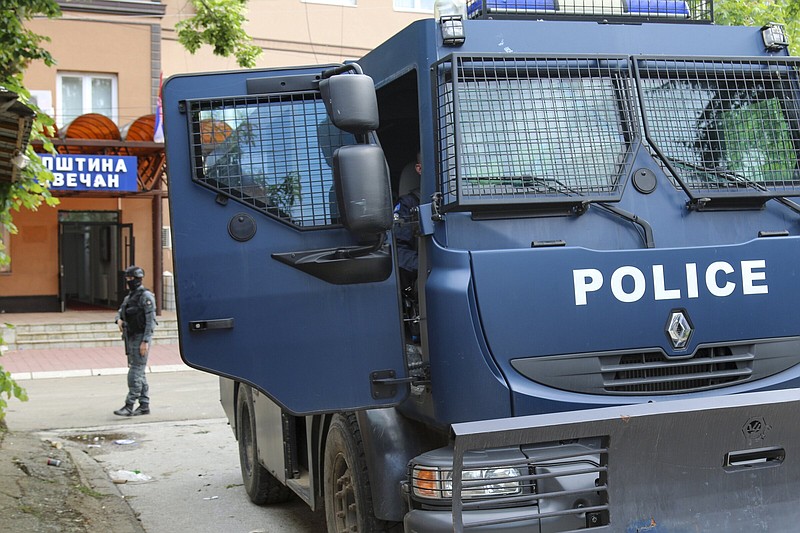BELGRADE, Serbia -- Serbia on Saturday condemned NATO-led peacekeepers stationed in neighboring Kosovo for their alleged failure to stop "brutal actions" by Kosovo police against ethnic Serbs, and said that its armed forces stationed near the border will remain on the highest state of alert until further notice.
Serbia's top political and security leadership, led by President Aleksandar Vucic, met Saturday in Belgrade following violent clashes a day earlier between Kosovo police and ethnic Serbs that injured more than a dozen people.
In response to the clashes, Vucic on Friday ordered troops closer to the border with Kosovo.
"Due to the brutal use of force by [Kosovo Prime Minister] Albin Kurti and his forces against the Serbian people in Kosovo ... the armed forces of the Republic of Serbia will remain at the highest level of combat readiness," said a statement after the meeting of top Serbian leadership on Saturday.
The statement also said an international civilian mission and NATO-led troops, that have been stationed in the former Serbian province since Serbian troops were forced to leave the region in 1999, "did not do their job" to protect the Serbs.
NATO spokesperson Oana Lungescu urged "institutions in Kosovo to de-escalate immediately" and called on all parties "to resolve the situation through dialogue." The alliance "remains vigilant & will ensure a safe & secure environment" in Kosovo, she said on Twitter.
Ethnic Serbs in northern Kosovo, who are a majority in that part of the country, tried Friday to block recently elected ethnic Albanian officials from entering municipal buildings.
Serb politicians in northern Kosovo on Saturday called on Serbia to suspend its participation in talks mediated by the European Union aimed at normalizing relations between the former war foes. Kosovo politician Goran Rakic said "we consider any further negotiations with Pristina completely illogical and also counterproductive."
Kosovo police fired tear gas to disperse the crowd and let the new officials into the offices. Several cars were set ablaze.
The United States and several Western countries condemned Kosovo's government for using police to forcibly allow entry to the municipal buildings. Kosovo Prime Minister Albin Kurti on Saturday defended the police action.
"It is the right of those elected in democratic elections to assume office without threats or intimidation," Kurti said on Twitter. "It is also the right of citizens to be served by those elected officials. Participation -- not violent obstruction -- is the proper way to express political views in a democracy."
PROTESTS CONTINUE
Meanwhile, crowds of anti-government protesters encircled the Serbian state television building on Saturday in downtown Belgrade to press their demand for Vucic to ease his tight grip on the mainstream media and allow alternative voices.
Tens of thousands of opposition supporters, some chanting slogans urging Vucic's resignation, streamed into the rain-drenched streets a day after the president's followers staged an equally big rally in the capital. Most of his supporters were bused into the capital from all over Serbia and some neighboring states.
Outside the RTS TV headquarters, the crowds claim that according to the laws, state TV should be unbiased as a public broadcaster, but that it has been openly pro-government.
Holding umbrellas amid heavy rain Saturday, the protesters walked slowly around the RTS television building in central Belgrade, completely covering the streets in the entire area.
Many held flowers in memory of the slain children and wore badges reading "vulture" or "hyena," mocking the expressions that officials used to describe the protesters.
After the rally officially ended, groups of people gathered in front of the Parliament and state TV buildings, claiming they wanted to enter by force. Organizers of the protest blocked them from entering, saying they were infiltrated by the authorities to try to portray the protesters as violent.
Held for the fourth time since the early May shootings, the opposition-led protests initially erupted in response to two back-to-back mass shootings earlier this month that left 18 people dead and 20 wounded, many of them children from an elementary school.
Other protest demands include the resignations of top officials and the revoking of licenses for pro-government media that air violent content and host crime figures and war criminals.
Vucic has accused the opposition of abusing the shooting tragedy for political ends.
Information for this article was contributed by Dusan Stojanovic, Llazar Semini and Jovana Gec of The Associated Press.
